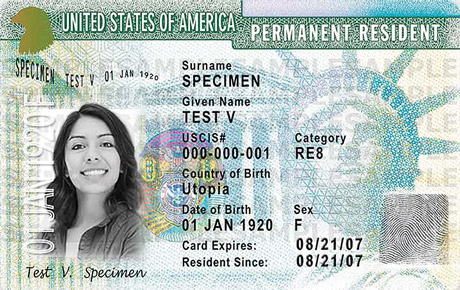US citizens
to 50,000 annually

New York: A drastic new immigration bill by Republican Senators, Tom Cotton from Arkansas and David Perdue from Georgia, would reduce the number of Green Cards issued annually from one million to 500,000, by doing away with the Diversity Visa Lottery and sponsorship for Green Card for siblings and parents of US citizens, among other measures.
“Donald Trump was the only one who saw that most Americans don’t like our current immigration system,” Cotton said in an interview with Politico last week. “This is just the area of politics where I think leaders and elites are most disconnected from the people. Not just Republicans but in both parties, in business, in the media, in the academy, culture and so forth.”
The Arkansas senator has already spoken with Trump and key White House officials about his immigration proposals, and says the administration has been receptive. Cotton dismisses research that shows the economic boon of immigrants, including low-skilled workers, by paraphrasing George Orwell: “Only an intellectual could believe something so stupid.”
Cotton and Perdue’s plan would allow only spouses and unmarried minor children to get green cards, although they would permit visas for aging adult parents whose American children are their caretakers — a population Cotton expects will be modest.
The bill also dumps the diversity visa lottery, which allots about 50,000 visas per year for citizens of countries that traditionally have low rates of immigration to the United States. And it would limit refugees to 50,000 annually – in line with levels outlined in Trump’s controversial executive order.
All told, the number of legal immigrants allowed into the United States under the bill — named the Reforming American Immigration for Strong Employment (RAISE) Act — would plummet by 40 percent in the first year and by 50 percent over a decade, according to analysis by Cotton’s aides. Cotton’s arguments, however, run counter to research that show immigrants are a net boon to the economy, from the high-skilled foreigners coveted by the tech industry to employees who work at hotels, restaurants and in agriculture. The so-called Gang of Eight bill passed by the Senate in 2013 crafted a new “W” visa program that would allow up to 200,000 low-skilled guest workers in the country per year, reported Politico.
Cotton didn’t address employment-based green cards or related visas in his latest measure, noting that the laws governing those issues are more complicated and “touch more entrenched interests.” He also declined to say directly whether he is open to expanding the pool of 85,000 H-1B visas allotted per year.
“There are obviously abuses of the H-1B visa program. I think those abuses need to be addressed before we even consider expanding the program,” Cotton said. “That said, if the evidence demonstrates that say, software companies need PhDs with computer science degrees and they’re going to pay them a wage that’s in the top 1, top 5, top 10 percent of local wages, I’m open to that kind of evidence.”
Fox News reported the RAISE Act would reduce green cards (for permanent legal residents) by limiting whom U.S. citizens can sponsor, ending the U.S. Diversity Visa Lottery for countries that have few American immigrants and cutting the number of refugees allowed into the United States.
Democratic Sen. Jeanne Shaheen, NH, called the legislation “senseless” and a “job killer.”
“This legislation sends a terrible message to the rest of the world and is unquestionably a job killer,” she said. “As a nation of immigrants, this bill runs counter to our values.”
Alabama GOP Sen. Jeff Sessions, confirmed last week as U.S. attorney general, was a leading Capitol Hill voice in the effort to curb legal immigration to protect American workers.
NumbersUSA, an anti-immigration organization, exulted in the bill by Cotton and Perdue.
“For several decades, immigrants no longer have been limited to bringing in a spouse and minor children. Chain Migration categories allow each immigrant (once a citizen) to petition for adult brothers and sisters, for adult sons and daughters, and for parents. Each of them can in turn do the same along with bringing their own spouses who can start whole new chains in their own families, and so forth in a never-ending pattern…Sen. Cotton would stop all of that immigration which adds millions of workers each decade without any regard to their skills or how they would affect Americans competing in the same occupations,” it said.
Key elements of the bill are:
Eliminate Outdated Diversity Visa Lottery: The RAISE Act would eliminate the 50,000 visas arbitrarily allocated to this lottery and limit refugees offered permanent residency to 50,000 per year, in line with a 13-year average.
Prioritize Immediate Family Households. The RAISE Act would retain immigration preferences for the spouses and minor children of U.S. citizens and legal permanent residents.
Eliminate would-be green card categories for foreign citizens who are: •Adult parents of U.S. citizens •Adult brothers and sisters of U.S. citizens •Unmarried adult sons and daughters of U.S. citizens •Married adult sons and daughters of U.S. citizens •Unmarried adult sons and daughters of legal permanent residents
The bill would seek to Create Temporary Visa for Parents in Need of Caretaking: For U.S. citizens who wish to bring elderly parents in need of care-taking, the RAISE Act creates a renewable temporary visa on the condition that the parents are not permitted to work, cannot access public benefits, and must be guaranteed support and health insurance by their sponsoring children.
Crime and security top items on
2-day agenda
The SG said crime continues to “pose a threat” to the Caribbean region and is not only a national issue for Member States, but also a regional matter that warrants a regional solution.
HoG will explore additional options as the conference will allow for holistic examination and the presentation of updates from Member States on crime-fighting strategies, the SG noted.
The participants will also receive updates on the Guyana/Venezuela and the Belize/Guatemala border issues.
One of the “central” issues that will be discussed over the two days, Ambassador LaRocque said, is the Caricom Single Market and Economy (CSME) which remains “unquestionably” the best vehicle to promote economic growth and development.
“There has been significant progress with respect to the single market while more needs to be done with respect to the single economy,” the Ambassador submitted. He also noted that there has been some progress in the productive sectors.
He informed that Heads of government asked last July for the review of the status of the CSME to be done and to be presented to them at this meeting and said this will be done.
One of the productive sectors that Member States will be looking at is Tourism. LaRocque stated that tourism is a major contributor to Gross Domestic Product (GDP) of the Region hence, Members will be looking at ways of enhancing the product to maximise its potential to fully assist in economic growth.
He said they have “consulted with the Caribbean Tourism on these matters and the areas which have been identified by them for discussion are: marketing of the region; human resources development; (and) strengthening the linkages of other sectors and transportation. Some of the other sectors for which linkages will be strengthened will be agriculture and the creative industries.”


